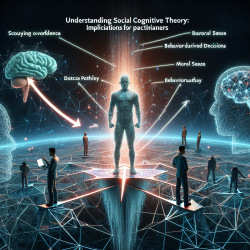Introduction
In the realm of caregiving for stroke survivors, informal familial caregivers often find themselves navigating a complex web of uncertainty. The recent research article, Addressing Uncertainty in Informal Familial Caregivers of Stroke Survivors: A Systematic Meta-Ethnography, provides a comprehensive analysis of the factors contributing to this uncertainty and offers insights into effective coping strategies. This blog aims to distill these findings into actionable insights for practitioners, particularly those involved in speech-language pathology, to enhance caregiver preparedness and improve outcomes for stroke survivors.
Understanding the Caregiver's Journey
The meta-ethnographic review synthesizes data from thirteen qualitative studies involving 218 participants across four countries. It highlights that the uncertainty faced by caregivers begins at the stroke event and extends into home-based care. This uncertainty is not only a source of emotional distress but also impacts caregivers' physical health and their ability to provide effective care.
Key Findings
- Factors Contributing to Uncertainty: Caregivers often lack knowledge about the stroke event, survivor prognosis, and available support options. This lack of information exacerbates feelings of uncertainty.
- Impacts of Uncertainty: Uncertainty can lead to concerns about managing finances, planning for the future, and coping with caregiving responsibilities. These concerns often result in feelings of hopelessness.
- Coping Strategies: Despite the challenges, caregivers identified several coping mechanisms, including present-focused thinking, gratitude, faith, humor, and social support. These strategies help mitigate the negative effects of uncertainty.
Implications for Practice
Practitioners can play a pivotal role in reducing caregiver uncertainty by implementing targeted interventions. Here are some evidence-based recommendations:
- Education and Skills-Based Support: Providing caregivers with comprehensive education about stroke events and caregiving skills can significantly reduce uncertainty. Peer-support groups can enhance this learning by offering a platform for shared experiences and emotional support.
- Cognitive Behavioral Strategies: Techniques such as cognitive restructuring and acceptance-based strategies can help caregivers manage their emotional responses to uncertainty. These interventions can be integrated into individual psychotherapy or peer-support settings.
Encouraging Further Research
While the current review provides valuable insights, there is a need for further research to explore the effectiveness of proposed interventions across diverse caregiver populations. Practitioners are encouraged to engage in research that considers the unique challenges faced by marginalized communities, ensuring that interventions are inclusive and accessible to all.
Conclusion
The journey of informal familial caregivers of stroke survivors is fraught with uncertainty, yet it is also a testament to resilience and adaptability. By leveraging the insights from this meta-ethnography, practitioners can enhance caregiver preparedness, ultimately leading to better outcomes for stroke survivors. To read the original research paper, please follow this link: Addressing Uncertainty in Informal Familial Caregivers of Stroke Survivors: A Systematic Meta-Ethnography.










